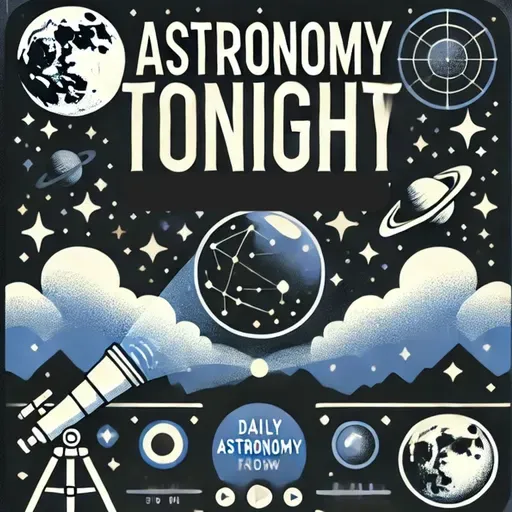
About
This is your Astronomy Tonight podcast.
On September 4th, 1892, the astronomy world was rocked by a celestial surprise that had stargazers scratching their heads and astronomers burning the midnight oil. On this day, Edward Emerson Barnard, an American astronomer with a keen eye and an even keener telescope, discovered the fifth moon of Jupiter, which would later be named Amalthea.
Now, you might think, "What's the big deal? Jupiter's got dozens of moons!" But back in 1892, this was groundbreaking stuff. Amalthea was the first new moon of Jupiter to be discovered since Galileo Galilei spotted the four largest moons way back in 1610. That's a 282-year gap, folks!
Barnard made this discovery using the 36-inch refractor telescope at the Lick Observatory in California. This was like upgrading from a pair of opera glasses to the Hubble Space Telescope in those days. Amalthea, named after a nymph in Greek mythology who nursed the infant Zeus, is a small, irregularly shaped moon, looking more like a cosmic potato than a perfect sphere.
But here's where it gets really interesting: Amalthea is so close to Jupiter that if you were standing on its surface (not recommended, by the way), Jupiter would appear 92 times larger in the sky than our Moon does from Earth. Talk about a view! It would be like having a giant, striped beach ball dominating your entire field of vision.
Amalthea's discovery opened the floodgates for finding more of Jupiter's moons. Today, we know of 95 moons orbiting the gas giant, with Amalthea holding its place as the third-largest among them.
So, the next time you're stargazing and spot Jupiter, give a little nod to Amalthea. It may be small, but it made a big impact on our understanding of the solar system.
Don't forget to subscribe to the Astronomy Tonight podcast for more celestial stories and cosmic curiosities. And if you're hungry for more fascinating tidbits, check out QuietPlease.AI. Thanks for listening to another Quiet Please Production!
On September 4th, 1892, the astronomy world was rocked by a celestial surprise that had stargazers scratching their heads and astronomers burning the midnight oil. On this day, Edward Emerson Barnard, an American astronomer with a keen eye and an even keener telescope, discovered the fifth moon of Jupiter, which would later be named Amalthea.
Now, you might think, "What's the big deal? Jupiter's got dozens of moons!" But back in 1892, this was groundbreaking stuff. Amalthea was the first new moon of Jupiter to be discovered since Galileo Galilei spotted the four largest moons way back in 1610. That's a 282-year gap, folks!
Barnard made this discovery using the 36-inch refractor telescope at the Lick Observatory in California. This was like upgrading from a pair of opera glasses to the Hubble Space Telescope in those days. Amalthea, named after a nymph in Greek mythology who nursed the infant Zeus, is a small, irregularly shaped moon, looking more like a cosmic potato than a perfect sphere.
But here's where it gets really interesting: Amalthea is so close to Jupiter that if you were standing on its surface (not recommended, by the way), Jupiter would appear 92 times larger in the sky than our Moon does from Earth. Talk about a view! It would be like having a giant, striped beach ball dominating your entire field of vision.
Amalthea's discovery opened the floodgates for finding more of Jupiter's moons. Today, we know of 95 moons orbiting the gas giant, with Amalthea holding its place as the third-largest among them.
So, the next time you're stargazing and spot Jupiter, give a little nod to Amalthea. It may be small, but it made a big impact on our understanding of the solar system.
Don't forget to subscribe to the Astronomy Tonight podcast for more celestial stories and cosmic curiosities. And if you're hungry for more fascinating tidbits, check out QuietPlease.AI. Thanks for listening to another Quiet Please Production!